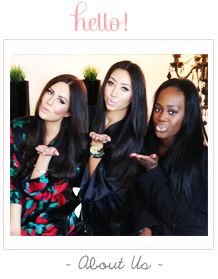Hair. It's one of those things that we spend countless hours styling, curling, and going to the salon to get done. A big part of our identity lies in our hair... blonde, brunette, curly, straight, etc. We love it, we can't stand it, we have good hair days and bad, but it's a part of who we are.
Now imagine for a minute; you receive a medical diagnosis, and the only way to regain your health is through treatments that cause you to lose your hair. Not only are you dealing with illness, but you're also faced with losing a part of your identity... a part that makes you feel beautiful, and most importantly, a part that makes you feel like yourself.
This could happen to anyone: you, your sister, your mother, your best friend. With the four best friends of Wigged Out, exactly that happened. Not only did Chelsea (diagnosed with Hodgkin's Lymphoma a few months before her wedding day) overcome her disease, but her friends provided endless support to her throughout the entire process. From wig shopping to forming their very own non-profit organization in honor of their best friend, we sat down with the ladies of Wigged Out to hear their story.
1. We love the sisterly bond that you share. How long have you all been friends?
Chelsea, Katie and Lindsey met here in Phoenix, where they attended Xavier College Preparatory. It is almost surreal to think we have been friends for 15 years! The summer before we packed up and left for college, Chelsea met Becca on the beaches of San Diego during a family vacation. Ironically, Katie, Becca and Chelsea then found themselves only a few months later in the same dorm at the University of Arizona.
2. Where do you each currently reside, and where did you go to college?
After high school, Becca Chelsea and Katie were Tucson-bound to attend The University of Arizona - Go Wildcats! At UofA Katie completed a degree in Communication, preparing her for what would soon become a very bright future in public relations. Chelsea balanced the completion of a degree in Psychology while serving as the Recruitment Chair for Kappa Kappa Gamma. Chelsea later completed a Masters degree in Marriage and Family Therapy from the University of San Diego in addition. Becca graduated from the College of Nursing, and was also a member of Delta Gamma. Lindsey was Cali-bound after graduation and attended The University of California, Santa Barbara. There she was also a Recruitment Chair for Delta Gamma and completed a degree in Communication. Lindsey later returned to Arizona to complete a Masters in Counseling at Arizona State – Go Devils! (sometimes, even best friends disagree)
Although all four of us have bounced around between Arizona, California and Las Vegas after graduation, most of us have settled back here in Arizona. We are incredibly lucky; three of us live only a bike ride away from each other. As a kid, you dream to live next door to your best friend. We are very fortunate to have been able to make that a reality as adults! We are currently campaigning for Becca to make the move from Las Vegas to Phoenix to join us!
3. Tell us about your journey getting started with Wigged Out-- what inspired you to make this into a non-profit organization?Chelsea: I was diagnosed with Hodgkin’s Lymphoma in January 2011. At the time, I was twenty-six years old and getting married in less than three months. After you hear you have cancer, you go numb. When you come back to what is now your “reality” a million questions start to arise, and with these questions come emotions, one being fear.
I remember flying to a wedding at the end of October and the plane having bad turbulence. As I braced myself, I put my hand over my chest and heart and felt a lump on the left side of my neck above my collarbone. Immediately, it did not feel right, but I chalked the lump up to allergies and moved on. A few months later the lump was still there, so I went to my doctor. It turned out to be cancer... and my entire world flipped upside down.
I couldn’t help but think, why me? How can this be happening? After the immediate shock subsided, I thought of my hair. How can I get married if I lose my hair? How can I face my world and be myself without my hair? Fighting cancer and going through treatments are challenging, but losing your hair adds another level of stress. When you are sick, you know you are sick, but sometimes you can hide it, maybe even fake it. When you start to lose your hair, it is difficult to hide the fact that you are sick. You have a daily reminder every time you look in the mirror. That was one of the hardest parts for me.
I remember wishing I was “stronger” and did not care about my hair loss. That's much easier said than done. Your hair is part of you, and I was not ready to part with it. I could not even drag myself to the wig shop. That is where my amazing girlfriends came into play. They went to a local wig shop, picked out an incredible wig & did the research on blonde wigs that I so perfectly was avoiding.
My friends also started thinking of a way to raise money in order to help fund my wig and other hair accessories (as these items tend to be pricey), and so became Wigged Out, Inc. What started as a kind gesture of helping a friend sick with cancer and grieving her hair loss has evolved into something much greater. Focusing on helping others to be able to feel like themselves at least when they look in the mirror.
4. Chelsea, what was it like trying on a wig for the first time? How did you feel?
Chelsea: I was still very much grappling with accepting my cancer diagnosis. In addition to having to accept this overwhelming fact I had to address the possible changes my body would experience as a result of my treatment. I was honestly not ready to admit that my hair was going to fall out. My straight blonde hair had been the counterpart to my personality for so long, I could not imagine one without the other. I was able to walk down the aisle and had to address a whole new list of questions and concerns. I was standing in a shop and looking at 10 wigs that I had to imagine myself walking down the aisle in. None of them looked like me, none of them were me. Two months away from the biggest day of my life, I left the store in tears. I didn’t feel like I was going to be able to find a wig that looked like me.
5. We love your mission of empowering people who have experienced medical hair loss. Does any story stand out in your mind where you felt the impact of your hard work?When Chelsea was diagnosed, we all experienced something we never imagined, we could barely fathom. It really opened our eyes to the incredible emotional, psychological, physical and financial struggle that medically related hair loss bestows upon an individual and their family. It is the story that inspired us to come together and one that will forever be a special part of all our hearts.
6. Chelsea, what advice do you have for other women going through a similar experience?
I think I would encourage someone to really use your support system and ask for help when you need it. I know it was not something that necessarily came easy for me. I think as women we feel like we must remain strong and our focus on supporting those around us rather than asking for help when we need it. It takes a lot of strength to ask for help. If perhaps you need a particular type of support, look to the organizations in your community (like Wigged Out) that can help support you. In establishing Wigged Out in the wellness community, we have learned about so many of the amazing community resources that are available.
7. As a whole, what advice do you have to support someone you love who is fighting an illness?
Watching someone you love and care about go through a similar experience is incredibly challenging. We would definitely suggest reaching out, even when someone says they’re ok. I think at times the person you’re supporting may not even know what they need, so being there and being available is really important. Simple things if possible – doing a lot of the research about wigs took a huge task off Chelsea’s plate at the time. Listen, listen, listen – it may feel like you did not do anything, but it may have been just what they needed. Finally, continue to be there, after the dust settles. Many of the people that reach out in a time of immediate crisis are not as available months later. Continue to reach out, even when it seems things are getting better.
8. How has this journey together made your friendships stronger?
Our 15-year friendship has afforded us many celebratory opportunities and carried us through some incredibly trying times as well. You truly see the inner beauty and character of an individual at these particularly vulnerable moments. Each experience has made us inexplicably better people as individuals, and undoubtedly better friends to one another.
9. What's the greatest lesson you have learned through starting Wigged Out?
Starting something from scratch is s a lot of hard work! It takes a significant amount of dedication. More than anything though, you need to be passionate about what you are doing in order to be successful.
10. If each of you could be remembered for one thing, what would it be?
10. If each of you could be remembered for one thing, what would it be?
As a whole we would love to be remembered for giving back the friendship, loyalty and support we have been able to provide to one another. Being a part of something greater than ourselves has been hugely rewarding for each of us. We would be so blessed to leave behind the legacy of something that could continue to grow and help others after we are gone.
To learn more about Wigged Out, visit them on their website and Facebook page. Thank you for sharing your story with us, ladies!



































